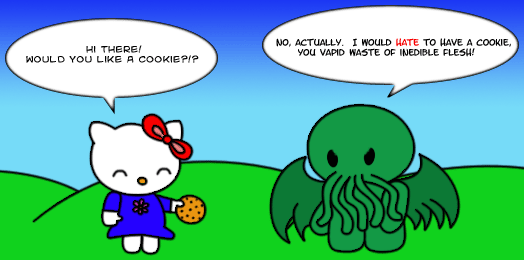|
Stardate
20040413.1549 (On Screen): There have been cases where product names or advertising campaign slogans which have crossed borders have turned out to have unexpected local meanings. Back in the day, Chevrolet had a bit of a problem with their Nova line of cars into Latin America, because in Spanish no va means "doesn't go".
There's a story I heard once which is probably apocryphal, but it could be true. After the "Road Runner" cable modem system became a success, using the Warner character under license, a company in Japan wanted to develop a competing system. As part of that, they decided they needed a cartoon character as well, so they hunted down the current owners of the classic Walter Lantz studio trademarks and licensed Woody Woodpecker.
As the story went, they decided that the core slogans in their ad campaign were going to include the phrase "Woody, the Internet Pecker". Supposedly an American employee of this company heard about that and was aghast, and diplomatically explained to the Japanese a particular way Americans would interpret woody and pecker if that campaign went forward.
I suspect that story is not true, but stranger things have happened. And this comes close.
The EU has decided to employ the services of popular Japanese mascot "Hello Kitty" to promote the union and the euro, according to French newswire AFP.
The mascot - extremely popular throughout Japan and Asia - will have an EU-style makeover, changing out of her traditional red or pink to don the blue and yellow of the EU flag.
A spokesperson told AFP that the European Union wanted to give "little presents to people so that they will remember the EU or be more aware of what the EU stands for".
"We thought this is something that has a lot of appeal", the spokesperson added.
The character turns 30 this year and coincidentally, the EU delegation to Tokyo is also celebrating its 30th birthday.
I wonder if the Japanese will interpret this the same way an American would: Europeans are pussies.
Update: Kyle writes to say that the story about the Chevrolet Nova is not true.
Update: On the other hand, Bryan says the story about Woody Woodpecker may well be true:
The company in question was supposedly Panasonic (Matsushita), in 1996. The main catchphrase for the campaign was "Touch Woody - the Internet Pecker."
A Google search on "touch woody" turns up various references to this incident, such as this one.
Most of the refers have "humor" somewhere in the URL or usenet group name, which would ordinarily tend to make one look askance at the veracity of the story. There is one Web page in Japanese, however, dating back to May '96, which looks like a marketing page for the product in question, which would seem to lend weight to the likelihood that this really happened.
Original Japanese article, whose encoding for some reason causes it to show up as gibberish on my screen.
Google cached snapshot of Japanese page, in which the Japanese characters show up properly, so that I can read it.
So I'd grade it as "likely true, but not completely verified."
The reason a lot of Japanese pages don't display properly is that they don't formally specify the character encoding in their header sections. That causes your browser to use its default, and if you're Japanese then the default is to interpret it as Japanese. But if you're American, the default is to interpret it as English, and the result is trash. It makes sense that Google would fix that for its cached version.
In the meantime: "Touch Woody, the Internet Pecker"? Good Lord!
Update 20040415: Christopher writes:
Actually, I think that the EU should be using Hello Cthulhu as it's mascot. That would fit a lot better. It thinks it's the lord of destruction, but is ultimately impotent and rather mind-numbingly cute.

Sounds right to me. (That's certainly what a lot of their anti-American rhetoric has sounded like.)
|